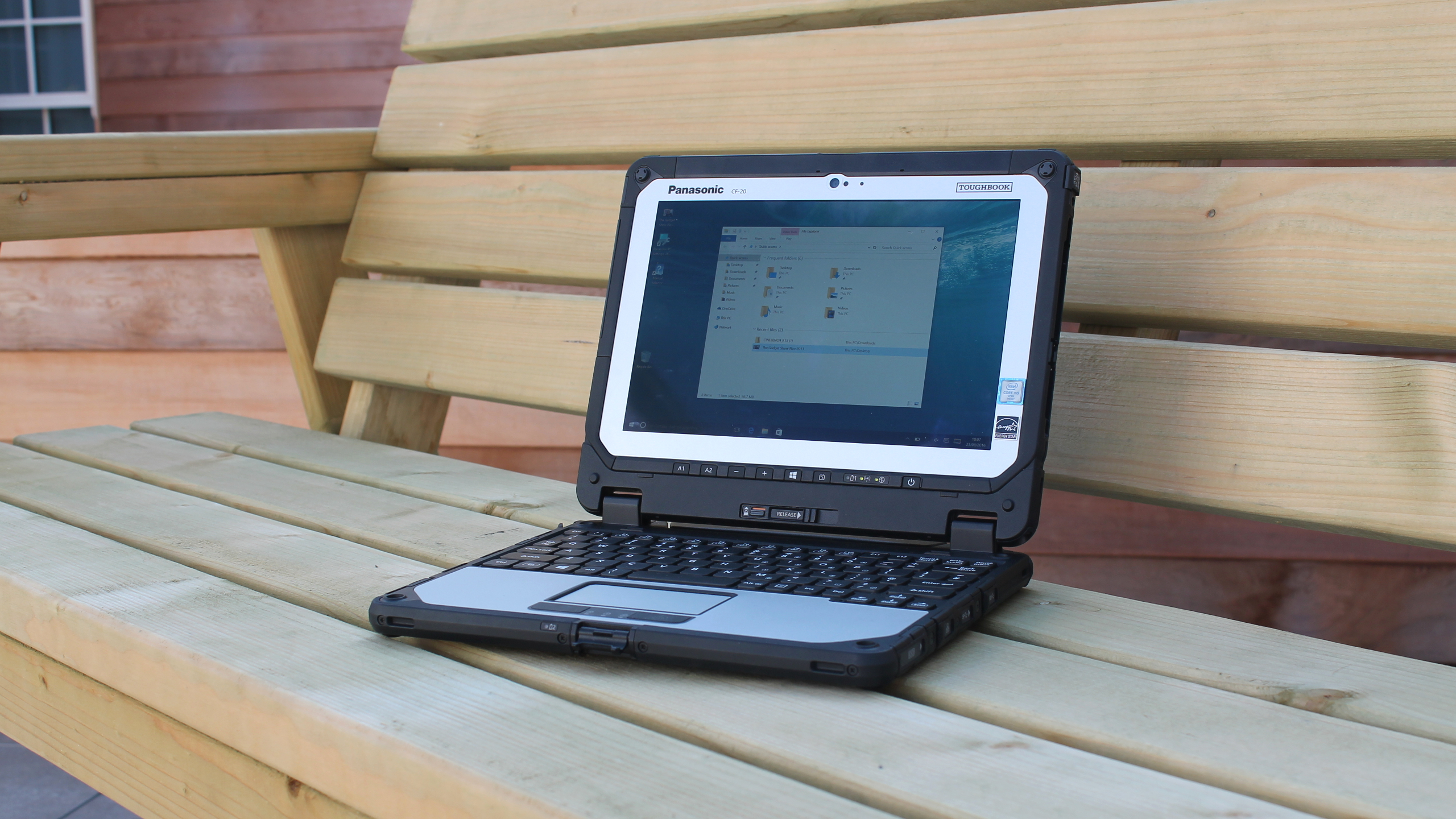Early Verdict
Panasonic has made a Surface Book for the business world. It may only be a small device, but it packs a solid frame and more processing power than is needed for business workers on the move.
Pros
- +
Highly durable
- +
Clear and crisp display
- +
Versatile
Cons
- -
Poor trackpad
- -
Cramped keyboard
Why you can trust TechRadar
Microsoft practically invented the convertible tablet category with its Surface line of devices, spawning a number of copycats with detachable keyboards. While these are fine for indoor use, their flimsy keyboard covers and low screen brightness (with odd exceptions, such has the Surface Pro 4) render them pretty useless for traversing challenging outdoor environments.
Panasonic is pitching its rugged ToughBook CF-20 as a device that offers the flexibility of a convertible tablet combined with the sort of solid build quality that has become synonymous with the company's ToughBook line of devices. It has more in common with Microsoft's Surface Book, design-wise, featuring a display that clicks onto a keyboard base that can be configured with a second battery for extra long runtimes on the move.
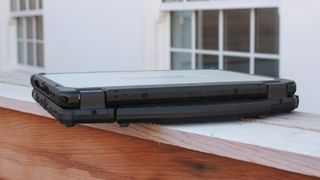
The CF-20 isn't some half-hearted Surface clone with a chunky chassis; it's a fully-fledged business machine with bells and whistles found along every chamfered edge. That's reflected in the price tag, which starts at a cool £2,661 (around US$3,508 or AUS$4,609). So what does that get your business?
Let's start with the CF-20's design. It would be a stretch to call it attractive, but the ToughBook's black-and-silver color aluminium does exude a certain industrial charm. Its 10.1-inch display, thick bezels and tiny chiclet-spaced keyboard keys give the impression of a netbook on steroids. Holding it by its extendable handle feels like carrying around a weighty aluminium lunchbox.
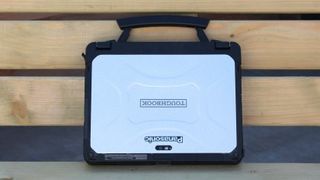
In all, the CF-20 weighs 3.9 pounds (900 grams for the tablet part), which to give you an idea weighs the same as Dell's 15-inch XPS 15 laptop. That heft, combined with the magnesium alloy chassis, lends the CF-20 a reassuringly solid feel. It would take brutal force to cause real damage here, such is its durability, as it's impossible to detect any flex no matter where you prod or poke at it. As you would expect, the tablet meets the MIL-STD810G standard meaning it can withstand drop, vibration, shock, temperature, explosive atmosphere, sand and rain.
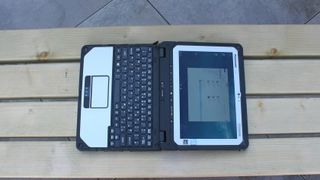
There's even protective plastic flaps to prevent ports from getting damaged when not in use. Connectivity includes RJ-45, USB 3.0, HDMI, audio-out, a MicroSD card slot, VGA and a Serial port, covering just about every base that workers would need when out in the field.
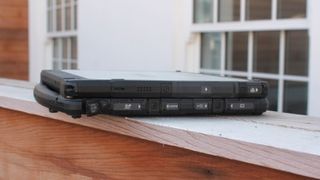
When it comes to the display, the CF-20 literally shines. We were impressed by the 400 nits-rated display on the Surface Pro 4, and here it's smashed out of the park. The Panasonic's 1,920 x 1,200 pixel-resolution display (224ppi) features a maximum brightness of 800cd/m2, which makes it incredibly easy to read even in direct sunlight.
It also brings 10-point touch to the business party, allowing you to navigate Windows 10's menus and toolbars using your finger. It's a good job too, as the CF-20's small trackpad proved a literal sticking point during our review. Swiping our finger across it too lightly meant it often failed to register anything on the screen, causing us to revert back to prodding and poking at it. You can also use an IP55-rated digitiser instead of your digits, which might be a preferred option for those working in absence of a mouse. On the plus side, the two rubberised left and right clicked buttons elicit a satisfying 'snap' when depressed, leaving you reassured that your press has registered.
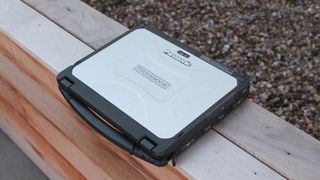
We encountered very little slowdown during our time with our CF-20 unit, which was powered by Intel's Core m5-6Y57 CPU backed up by 8GB of RAM. Even after opening multiple apps and running two browser windows with 20 tabs loaded with each failed to significantly slow down the device.
Benchmarks
Cinebench R15: OpenGL: 25.18 fps; CPU: 206 points
Geekbench (Single-Core): 2,475 points; (Multi-Core) 4,364 points
Battery test (1080p looped video streamed over Wi-Fi in Edge, 50% brightness): 7 hours 55 minutes
The keyboard base is a significant part of the overall devices, measuring 37mm thick. It can be configured with a second battery, although our review unit did not come with one installed. The ToughBook still managed impressive battery runtimes. reaching almost eight hours with the brightness lowered to the halfway point in Windows 10, which remained plenty readable thanks to the device's searingly bright display.
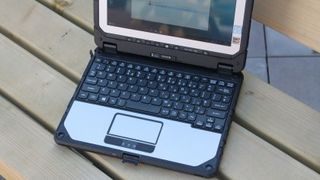
The keyboard's keys are a little cramped but surprisingly usable, offering crisp feedback and keycaps just large enough to ensured that we didn't make too many typing errors. Field operatives tasked with typing up short reports will have no trouble doing so on the CF-20, though we obviously wouldn't choose it over a full-sized laptop for bashing out longer documents.
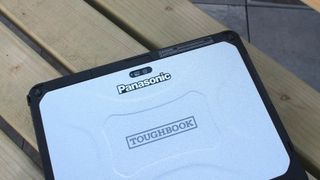
Detaching the tablet part of the display is incredibly simple, requiring a quick shift of the release mechanism located above the middle of the keyboard. Removing it is as simple as lifting up the tablet part in one swift motion, which prompts Windows 10 into giving a confirmation that it has been successfully unlocke. Slotting it back in is a case of lining up two metal teeth and lowering the tablet to click it back into place.
Early verdict
The CF-20 might not look like a flagship offering, but it feels like one in the hand and performs like one under strain. It's impressive how Panasonic has managed to keep the device relatively light while crafting it from such strong materials.
Throw in an abundance of ports, a small, yet crisp and bright display and excellent battery runtimes (which could be extended with another battery), and it adds up to make a device that leaves no stone upturned for outdoor workers. It's not perfect though, due to its inevitably cramped keyboard and sticking trackpad, which form two minor blots on an otherwise impressive package.
What is a hands on review?
Hands on reviews' are a journalist's first impressions of a piece of kit based on spending some time with it. It may be just a few moments, or a few hours. The important thing is we have been able to play with it ourselves and can give you some sense of what it's like to use, even if it's only an embryonic view. For more information, see TechRadar's Reviews Guarantee.
